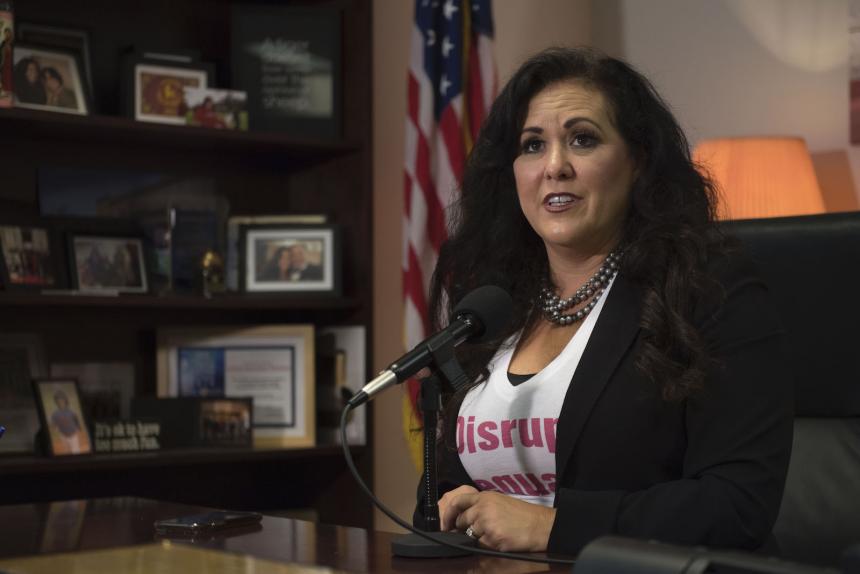
Car being loaded onto a flatbed tow truck. (Photo: public domain)
Tow No! New Fees, New Costs for State Towing Biz
Towing companies do not get paid for towing homeless campers/RVs and cannot recoup the cost
By Thomas Buckley, August 13, 2024 9:34 am
The towing and vehicle storage business may not be the most glamourous, but it is indispensable.
Helping clean up after wrecks, moving nuisance vehicles out of the way, responding to emergencies, storing impounded cars, clearing the freeways as quickly as possible and providing roadside assistance to stranded motorists – this is what they do all day.
When you are stranded in Zyzxx on your way back from an unfortunate weekend in Vegas, towers are wonderful lifesavers – when you forgot it was street sweeping day and your car disappears, not so much.
And now there are two new challenges facing the industry – one, of course, from the California Air Resources Board (CARB) and the other from homeless encampments.
First, the homeless encampments. In the past few days, Gavin Newsom has decided that the countless homeless encampments that have festered across the state during the last six years of his governorship have got to go. Citing a United States Supreme Court ruling that struck the right to flop down and live wherever you want, Newsom has “urged,” “called on,” “encouraged,” and “demanded” local authorities do something.
Some cities are digging in their politically progressive stiletto heels and refusing – or at least setting the speed on fixing the issue to “crawl” – but there are locations across the state that are staring to clean things up.
The folks in the towing industry are generally very supportive of this effort, but there is a glitch for them – the cost.
Because, typically, when a city or a county calls on one of its contracted towers to come out and help get rid of the junked vehicles and campers from an encampment, the towers are not getting paid.
Very broadly, a tower can take a vehicle to its lot, contact the owner, and charge a storage fee until it’s picked up. Worst case scenario, if no one claims the vehicle they can typically then break it down for parts to recover a chunk of their costs (yes, eventually the vehicle can be sold but cars found in encampments tend not to be in the best working order.)
So that’s cars – and, oddly, boats, too – a number of terrible humans who don’t want to pay to get rid of their boat properly simply dump them at encampments and they get lived in so the residents do not complain.
But campers and recreational vehicles (RVs) are a huge problem. First, there are a lot of them. Second, they are a pain to move and store. And third, they are utterly worthless.
A garbage and waste and meth-infiltrated camper cannot usually be broken down for parts, let alone just be sold on. And the chances of finding and charging the actual owner for towing and storage? Good luck.
So what happens is that the towing companies – like Hamner Towing in Corona – get stuck with the them.
Casey Horvath, vice-president of Hamner – said the firm supports the cleaning efforts and that part of its mission is “serving the public.”
But – unlike other vehicles – homeless campers/RVs are literally worthless.
“There’s nothing usable,” Horvath said.
The result is that towing companies do not get paid for the towing and cannot recoup the cost and cannot spare the storage space so they literally pay other people to take them away. Each homeless RV his company has dealt with has cost Hamner in the $2,000 to $3,000 range.
It also can mean that towers have to increase rates for everyone else to cover the loss.
As to CARB’s direct issue – earlier this year towing and other diesel trucks have had to to start smog testing.
In a sense it’s like the automotive colonoscopy every car owner in California is already used to.
But it is the differences that are causing headaches for the towing and other diesel-based truck industries.
To get a vehicle registered, it now must undergo an annual smog check – if a company has newer vehicles with onboard diagnostic systems, it can buy a “CARB approved” device (another $1,500 bucks) which will then upload the results to the agency. If it fails to pass, the truck must be fixed until it does pass of it cannot operate.
Older and certain other vehicles must be taken to “CARB approved” shops for testing.
Each test is $30 and must be done annually…for now. In the future, it is possible CARB will require the test up to four times a year and, or course, failure takes the truck off of the road.
And what does every CARB-banned tow truck mean? Further delays in clearing accidents on freeway and taking longer to help idled motorists.
Buy new trucks to make sure to pass the reportedly very twitchy and unreliable test you say? Sure – at about $160,000 a pop and that is they can even be found in California:
In 2020, CARB created the Advanced Clean Truck (ACT) regulations. Those rules (along with modifications to other regulatory instruments) are now starting to take effect and already have devastated the state’s truck sales sector – for example, you have to sell one zero-emission vehicle (ZEV) for every nine regular diesel semis and the ZEVS do not exist and/or companies are simply not buying them because they do not have the range and capacity as a diesel truck (oh, and they’re about twice as expensive) so you can’t sell, or buy, diesel at all.
Part of the CARB rules exempts “emergency vehicles” from the regulations, but there is a problem: it only exempts government owned emergency vehicles and not typical tow trucks.
And if that wasn’t irksome enough, here is the outline of the smog process:
If a vehicle fails the emissions tests it is marked NON-COMPLIANT and cannot operate in California until a passing test has been submitted.
Overview Fact Sheet-Clean Truck Check | California Air Resources Board
Please report your vehicles to https://cleantruckcheck.arb.ca.gov/
and follow these 3 steps.
-
- Account Registration Module (Do NOT Use Firefox)
- Individual Vehicle Upload Module
- Fee Payment Module (Microsoft Edge ONLY)
- Credentialed Testers-Search by Location (Not Required until 2025)
Payments take 1 day for card payments and 7 business days for echeck payment to generate your certificate. DMV is notified of your compliance the night that your Clean Truck Check certificate is available to download in your CTC-VIS account.
If you have a DMV hold it will be lifted 2-3 days after your Clean Truck Check Certificate is generated in your account.
You will need to VISIT the DMV to request your registration tags after the hold has been lifted.
All this leaves one question – what if your trucks are Mac?
Sorry, couldn’t resist the pun…
- Benefit Fraud Problems and Solutions - November 7, 2024
- A Little Exit Poll - November 5, 2024
- Tomorrow’s Headlines Today! - November 5, 2024





“When you are stranded in Zyzxx on your way back from an unfortunate weekend in Vegas…”
The name of the exit off the 15 Fwy. is Zzyzx Rd., not Zyzxx, and you wouldn’t be stranded in Zzyzx, since it’s an actual place that is 4.5 miles when/if you exit off the 15, out in the desert. You might be stranded at the Zzyzx EXIT, but not in Zzyzx.
https://en.wikipedia.org/wiki/Zzyzx,_California